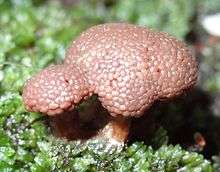Tubifera
Tubifera is a genus of slime moulds from the subclass Myxogastria. The genus comprises 12 species.
| Tubifera | |
|---|---|
.jpg) | |
| Tubifera ferruginosa | |
| Scientific classification | |
| (unranked): | |
| Infraphylum: | |
| Class: | |
| Order: | |
| Family: | Tubiferaceae |
| Genus: | Tubifera G.F.Gmel., 1792 |
| Type species | |
| Tubifera ferruginosa (Batsch) J.F.Gmel., 1791 | |
Description
The fruit-bodies are aethalia formed from numerous, usually densely packed sporangia. The oblong sporangia are ochre, pink or red to dark brown and may be shiny or shimmering. They open at the tip to release the spores.[1]
The hypothallus is spongy, occasionally raised to a stem-like, stock, dark-coloured structure or also, on Tubifera bombarda, soft and film-like thin. The membranous, single layered peridium outlasts the below half. A pseudocapillitium may or may not be present. The spores are light yellow to reddish-brown.[1]
Habitat
Tubifera ferruginosa and Tubifera microsperma are more widespread and common than the other species from this genus.[2] All species, except Tubifera casparyii, are also common in the tropics.[1]
Classification
The genus was circumscribed in 1873 by Józef Thomasz Rostafiński. The type species is Tubifera ferruginosa, first characterized as a Stemonitis species.
Species
The genus comprises the following 12 species:[1]
- Tubifera applanata[3]
- Tubifera casparyii
- Tubifera corymbosa[4]
- Tubifera dictyoderma
- Tubifera dimorphotheca
- Tubifera dudkae[4]
- Tubifera ferruginosa
- Tubifera magna[4]
- Tubifera microsperma
- Tubifera montana[4]
- Tubifera papillata
- Tubifera pseudomicrosperma[4]
 Tubifera applanata
Tubifera applanata Tubifera corymbosa
Tubifera corymbosa Tubifera dudkae
Tubifera dudkae Tubifera microsperma
Tubifera microsperma
Previously included species
- Alwisia bombarda (as Tubifera bombarda)[5]
References
| Wikimedia Commons has media related to Tubifera. |
- Marie L. Farr: Myxomycetes, New York Botanical Garden, 1976, p.101
- Michael J. Dykstra, Harold W. Keller: Mycetozoa In: An illustrated guide to the protozoa : organisms traditionally referred to as protozoa, or newly discovered groups, Society of Protozoologists, 2000, p.977
- Leontyev, D.V.; Fefelov, K.A. (2012). "Nomenclatural status and morphological notes on Tubifera applanata sp. nov. (Myxomycetes)". Mycotaxon. 120: 247–51. doi:10.5248/120.247.
- Leontyev, Dmitry V.; Schnittler, Martin; Stephenson, Steven L. (2015-09-01). "A critical revision of the Tubifera ferruginosa complex". Mycologia. 107 (5): 959–985. doi:10.3852/14-271. ISSN 0027-5514. PMID 26240306.
- Leontyev, Dmitry V.; Schnittler, Martin; Moreno, Gabriel; Stephenson, Steven L.; Mitchell, David W.; Rojas, Carlos (2014-09-01). "The genus Alwisia (Myxomycetes) revalidated, with two species new to science". Mycologia. 106 (5): 936–948. doi:10.3852/13-314. ISSN 0027-5514. PMID 24987129.